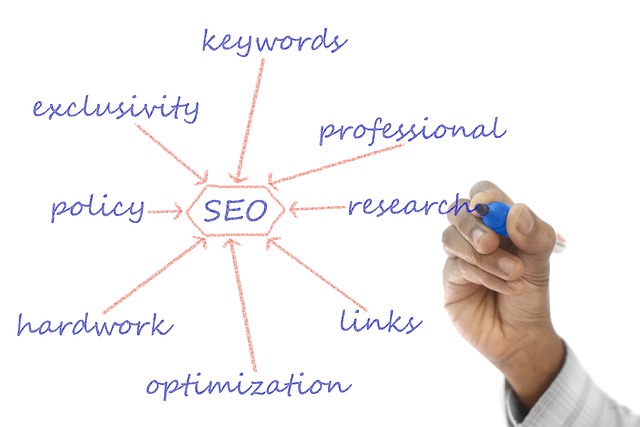Website content auditing is a strategic process that evaluates every textual element on a site against SEO best practices, brand standards, and user needs. It goes beyond basic grammar checks by assessing keyword effectiveness, readability, consistency, and audience value. Regular audits, crucial in the dynamic digital landscape, optimize meta tags, headings, and content to attract broader audiences and improve search engine rankings. Using tools like Ahrefs, SEMrush, or Moz, combined with manual assessments, ensures compelling and SEO-aligned content. Strategic enhancements include aligning content with user intent, optimizing for keywords, diversifying formats, and implementing internal linking strategies. Measuring success through KPIs like organic traffic growth, keyword rankings improvements, and reduced bounce rates guides resource prioritization and optimizes user experiences for better engagement and conversion rates.
Website content auditing is a crucial process for any online business aiming to enhance its digital presence. This article provides a comprehensive guide to navigating the intricacies of website content audits, empowering you to optimize your SEO strategy and content quality. From understanding the core concepts to exploring effective tools and techniques, we’ll delve into best practices that ensure your website’s content is not just visible but also engaging and performant. Discover key elements to evaluate, strategic improvements, and successful measurement methods for optimal SEO content writing.
Understanding Website Content Auditing: A Comprehensive Overview

Website content auditing is a meticulous process that involves evaluating and analyzing every piece of textual information on a website to ensure it aligns with SEO best practices, brand guidelines, and user expectations. It goes beyond simple grammar and spelling checks; it delves into the effectiveness of keywords, readability, consistency, and overall value delivered to the audience. A comprehensive content audit can reveal hidden opportunities for improvement, from optimizing meta tags and headings to enhancing user engagement through compelling copy.
This strategic review is particularly crucial in today’s digital landscape where search engine algorithms continuously evolve. SEO content writing, a vital aspect of digital marketing, demands constant refinement. By auditing website content regularly, businesses can stay ahead of the curve, maintain high search engine rankings, and provide visitors with relevant, high-quality information that drives conversions and fosters brand loyalty.
The Role of SEO in Content Auditing Process

In the digital realm, where websites compete for online visibility, Search Engine Optimization (SEO) plays a pivotal role in content auditing. It’s not just about ensuring readability; it involves strategic adjustments to boost search engine rankings. SEO Content Writing is an art that intertwines with every step of the auditing process, from keyword research to meta description optimization. By understanding user intent and integrating relevant keywords naturally, content creators can enhance both the quality and quantity of website traffic.
Effective SEO practices enable content auditors to assess not just the relevance but also the performance of web pages. It helps in identifying areas where content can be refined to capture a broader audience, improve click-through rates, and reduce bounce times. Through on-page optimization techniques, such as title tag adjustments, header structuring, and internal linking, the overall user experience is enhanced, making websites more engaging and search engine-friendly.
Key Elements to Evaluate During a Content Audit

When conducting a content audit for SEO Content Writing, several key elements need thorough evaluation to ensure optimal performance and search engine visibility. Firstly, assess the relevance and quality of keywords used throughout the website’s content. Keywords should be strategically placed in titles, headings, and body text, aligning with the target audience’s search queries. Their density and placement are crucial factors that impact SEO rankings.
Additionally, check for content freshness and updates. Search engines favor recent, regularly refreshed content as it reflects the website’s relevance and timeliness. Examining publication dates and updating frequency helps identify areas that may require revision to keep up with industry trends and user information needs.
Tools and Techniques for Efficient Content Auditing

Website content auditing is a meticulous process, but leveraging the right tools and techniques can streamline efficiency. SEO content writing requires a deeper dive than surface-level analysis, focusing on keyword optimization, readability, and overall user experience. Specialized SEO audit tools like Ahrefs, SEMrush, or Moz offer comprehensive insights into website performance, identifying issues with meta tags, headers, and content relevance. These platforms provide actionable recommendations to improve search engine rankings.
Manual auditing complements automated tools by allowing experts to assess creative elements like copy tone, visual appeal, and user engagement. Techniques include A/B testing to compare different versions of web pages, analyzing competitor content for gaps or opportunities, and using analytics data to track keyword performance and user behavior. By combining these methods, businesses can ensure their website content is not only SEO-friendly but also compelling and aligned with audience needs.
Strategies for Improving Content Quality and SEO Performance

Elevating content quality and SEO performance goes hand in hand with implementing strategic enhancements. One key approach is to prioritize SEO Content Writing that aligns with user intent, focusing on keyword optimization while maintaining readability and relevance. Incorporating a variety of content formats like blog posts, infographics, and videos not only caters to diverse learning styles but also boosts engagement, signaling to search engines the site’s value and authority.
Regularly auditing and updating content is essential for staying relevant in a dynamic digital landscape. This involves removing outdated information, optimizing meta tags and headings, and ensuring mobile responsiveness. By integrating internal linking strategies, you create a structured user experience that encourages longer session durations and lower bounce rates—all factors that positively impact search engine rankings.
Measuring Success: Evaluating the Impact of Content Audits

Measuring success is a vital component of any content auditing process, especially in the realm of SEO content writing. By evaluating the impact of audits, website owners and content creators can gain valuable insights into their strategies’ effectiveness. This data-driven approach enables them to make informed decisions about future content development and optimization. Key performance indicators (KPIs) such as organic traffic growth, keyword rankings improvements, bounce rate reductions, and increased time spent on site are essential metrics to track. These metrics provide a clear picture of how content audits are enhancing user experience and search engine visibility.
Through regular content auditing and subsequent impact assessments, teams can identify trends and patterns that highlight high-performing content and areas for improvement. This knowledge allows them to prioritize resources efficiently, ensuring that SEO efforts are focused on the most impactful sections of a website. As a result, sites can be optimized to attract and retain audiences, driving better engagement and conversion rates.
Best Practices for Regular Website Content Audits

Regular website content audits are essential for maintaining and enhancing online visibility through effective SEO content writing practices. Here are some best practices to ensure comprehensive audits:
Start by defining clear goals and objectives for your audit, aligning them with your broader digital marketing strategies. This focuses the review process, enabling you to assess if your web pages are optimized for relevant keywords, target the right audience, and deliver valuable, engaging content. Next, employ a systematic approach, auditing content across all critical pages, including home pages, service/product pages, blogs, and category pages. Utilize SEO tools to analyze keyword rankings, page load speeds, mobile responsiveness, and meta data optimization, comparing performance against industry standards and competitors.
